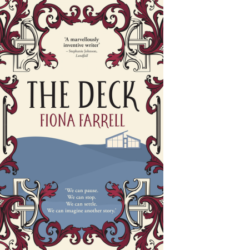50 Books by 50 Women: Fiona Farrell

The Deck by Fiona Farrell ~
A novel about telling stories in a time of change.
What is the point of inventing stories when reality eclipses imagination?
A little way off in the future, during a time of plague and profound social collapse, a group of friends escapes to a house in the country where they entertain themselves by playing music, eating, drinking and telling stories about their lives. There are tales of thieves and pirates, deaths and a surprise birth, a freak wave and many other stories of misadventure resulting in unexpected felicity.
The Deck borrows the motifs of Giovanni Boccaccio’s 14th-century masterpiece, The Decameron, in which another small group gathered to avoid contagion and passed the time telling stories. But what is the role of fiction, this novel asks, as civilisation falters?
“Here you are: a novel. From my fingers to your hand, from my eye to your eye, from the crevices of my crumpled brain to the crevices of yours.
The novelist is making a novel.
She is making it on an Apple Mac in a small room overlooking a small city on an island in the southern corner of a vast ocean.
Midsummer.
Sunlight glints on a harbour and a breeze bellies the curtains at an open window. An undifferentiated hum of traffic and machinery rises from the city. Someone is drilling something in the old Edwardian villa next door and across the road the children at the day-care centre are banging away on the big xylophone they bring outside on sunny days. Overlying the hum is a cheerful gamelan bing bang bong.
Beyond the harbour stretches the ocean, bordered as usual at the horizon by the mass of cloud that could be hills or snowcapped mountains. Air and vapour only but so seemingly solid that Captain Cook, sailing down this coast on his first voyage, detoured many miles to the east over three days in order to satisfy his lieutenant that this was no great continent. ‘In search of Mr Gore’s imaginary land,’ he wrote grumpily in his journal. He himself was ‘very certain we saw only clouds’.
The imaginary land has always been present. The novelist remembers it from earliest childhood when she sat crammed with her sister in the back seat of the Austin Standard on Sunday afternoons, her family parked up at Friendly Bay eating ice-creams and looking out to sea, as islanders do. The cool lick of Raspberry Ripple and the cloudy mountains that were the place called Overseas. People sometimes flew there and when they returned they brought pictures to project on the sitting-room wall of palm trees and palaces and skyscrapers and places where the streets were made of water and places where people rode on camels and elephants. Overseas. The bright colours of the cloud land overlaid the beige stripes of the sitting-room wallpaper.
But today the pictures are not so pretty. A plague is raging and the pictures of Overseas are the deserted boulevard, the crowded hospital ICU, the army trucks queuing in the piazza to collect the coffins, the city park crisscrossed with burial trenches. It is months now since the novelist looked up a place called ‘Wuhan’ and its dubious ‘wet market’. Months since she looked up ‘pangolins’, such sweet little vectors of catastrophe with their coats of armour-plating and their long snuffly noses. Months since she looked up a virus that appeared online as a soft little ball ornamented all over with tassels of red or blue. This past Christmas a woman in the novelist’s city crocheted Covid-shaped tree decorations. A dark joke but it proved popular. The novelist bought a few to hang among the tinsel.
Deadly viruses do not necessarily declare themselves by looking repellent. Tuberculosis, for example. When the microbiologist Robert Koch back in 1882 first discovered the tiny silvery rods of Mycobacterium tuberculosis, killer of millions for millennia, he thought them ‘beautiful’.
For months now, the news has been of global death and infection, the numbers reported daily like some hideous league table that implicitly pits nation against nation, leader against leader, health system against health system, political structure against political structure. Within the past 24 hours the novelist knows this plague has caused 563 deaths in the UK, 1807 in the US, 469 in Brazil, 361 in Italy and on and on, each death its own little individual horror of breathlessness, the lungs choking on dead cells, clots clumping in the blood vessels of the brain, confusion, seizure, stroke, liver failure, kidney collapse. Each number is a woman, a man, who was born into their own world of light and lived there until the virus and the moment where they lay face down on the gurney, going out naked into the dark, profoundly alone.
Today on the league table, the novelist’s country has scored zero. For months it has scored zero.”

